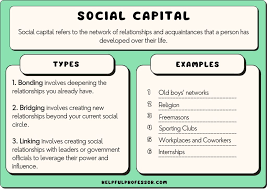In contemporary society, building social capital is an essential endeavor that transcends mere networking. It encompasses fostering relationships that enhance community welfare, unity, and mutual understanding. The Bahá’í teachings provide a profound framework for cultivating social capital, emphasizing the importance of individuality, interconnectedness, and collective progress. This article delves into the principles of Bahá’í teachings and offers comprehensive guidelines on how individuals can actively engage in building social capital.
Understanding Social Capital through Bahá’í Lens
Social capital can be defined as the networks, relationships, and norms that facilitate cooperation and collaboration among members of a society. In the Bahá’í context, social capital is intricately linked to the concept of unity in diversity. The Bahá’í teachings assert that humanity is one family, and it is through fostering relationships that we realize this profound truth. Thus, social capital is not merely an asset; it is a vehicle for fostering understanding and harmony among different cultures and backgrounds.
1. Cultivating Individual Attributes
At the heart of building social capital is the development of personal virtues and qualities. The Bahá’í teachings emphasize the importance of attributes such as kindness, generosity, and integrity. Individuals seeking to enhance their social capital must first embark on a journey of self-improvement. This involves:
- Reflective Practice: Engaging in regular self-reflection to identify personal strengths and weaknesses can foster a heightened sense of empathy and social awareness.
- Community Service: Actively participating in community service not only benefits society but also promotes personal growth and strengthens connections with others.
These practices encourage a more profound connection to the community, laying the groundwork for meaningful relationships.
2. Fostering Inclusive Communities
The Bahá’í teachings advocate for inclusivity and the celebration of diversity. Building social capital necessitates the creation of environments where all individuals feel valued and included. This can be achieved through:
- Creating Safe Spaces: Establishing forums for dialogue where people from various backgrounds can share their experiences and perspectives fosters mutual respect and understanding.
- Organizing Interfaith Gatherings: Promoting gatherings that embrace different faiths encourages collaboration and sharing of values, strengthening the communal bonds that make social capital thrive.
These endeavors not only cultivate a sense of belonging but also empower individuals to contribute to the broader community fabric.
3. Networking with Purpose
Networking is often misconceived as a transactional interaction. However, in the context of Bahá’í teachings, networking should be rooted in genuine relationships. To effectively build social capital, one must approach networking with intention by:
- Listening Actively: Genuine connection arises from understanding others’ hopes and aspirations. Active listening fosters deeper relationships, allowing for collaborative opportunities that benefit the community.
- Building Trust: Trust is the cornerstone of any relationship. Being transparent, reliable, and consistent strengthens one’s reputation and encourages others to engage reciprocally.
When networking becomes a method of uplifting others, it transforms into a tool for building substantial social capital.
4. Utilizing Technology for Connectivity
In the digital age, technology presents both challenges and opportunities for building social capital. The Bahá’í teachings advocate using technology to connect individuals and communities more effectively. To harness its potential, one can:
- Engage on Social Media: Utilize platforms to share uplifting and educational content that promotes unity and knowledge-sharing among diverse groups.
- Create Virtual Communities: Establish online forums that encourage dialogue and collaboration, enabling individuals to connect regardless of geographical constraints.
While technology can bridge distances, it is imperative to maintain authenticity and empathy in digital interactions, ensuring that relationships remain valuable and impactful.
5. Promoting Collective Action
Collective action is vital in addressing societal challenges and promoting social welfare. Guided by Bahá’í principles, efforts should be made to rally communities around common objectives through:
- Joint Projects: Collaborating on community service projects can unite individuals with diverse backgrounds, creating a sense of shared purpose and enhancing social capital.
- Civil Society Engagement: Encouraging participation in organizations that advocate for social change enables individuals to work together towards shared goals, deepening their interconnectedness.
When individuals come together to tackle challenges, they not only build social capital but also contribute to a more cohesive society.
Conclusion: The Path to Social Cohesion
The teachings of Bahá’u’lláh offer profound guidance on building social capital, rooted in principles of compassion, unity, and integrity. By fostering individual attributes, promoting inclusivity, networking with purpose, utilizing technology, and advocating for collective action, individuals can significantly contribute to building bridges within their communities. In a world increasingly characterized by division, embracing these teachings can lead to enhanced social capital and a more harmonious existence for all. Through conscious efforts to connect, uplift, and collaborate, each person can play a pivotal role in the collective journey towards unity and understanding.
